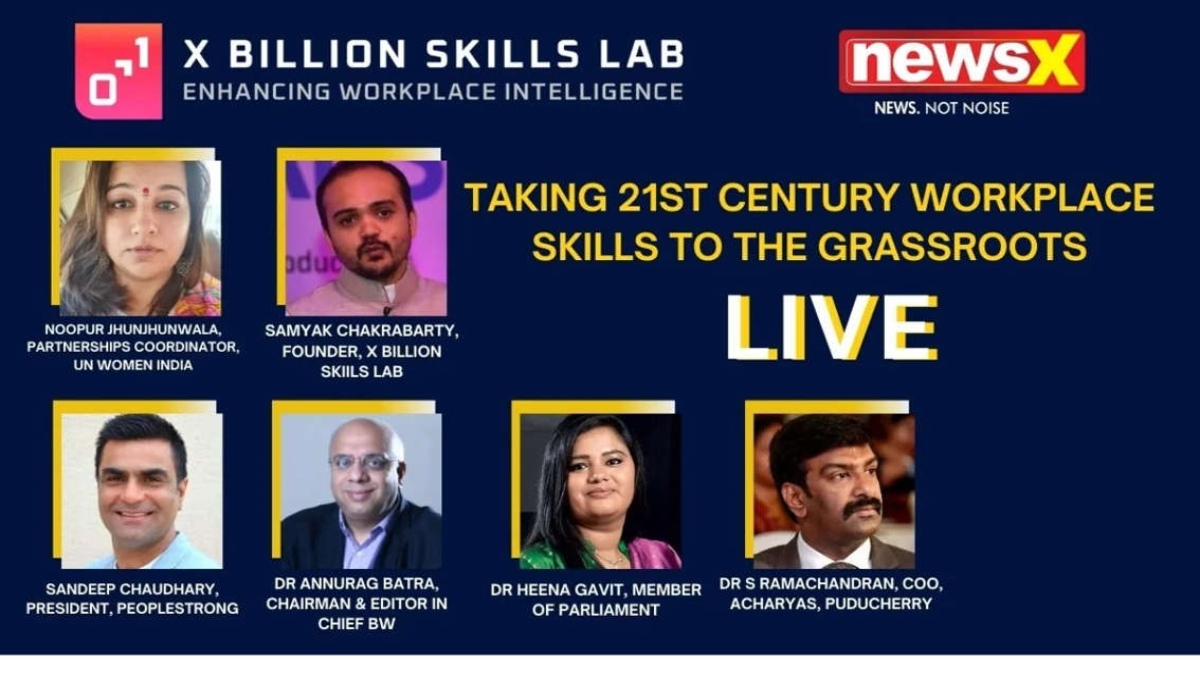
X Billion Skills Lab, in its mission to take 21st century workplace to the grassroots, recently organised an insightful webinar with industry leaders to discuss ways on how we can take workplace skills to graduates hailing from Tier 2 and Tier 3 cities. Our panelists, who joined us for a conversation on this pertinent topic, were Dr Heena Gavit (member of Parliament), Sandeep Chaudhary (president at PeopleStrong), Dr Annurag Batra (Chairman & Editor-In-Chief at BW Businessworld), Dr S. Ramachandran (COO at Acharyas, Puducherry), Noopur Jhunjhunwala (Partnerships Coordinator at UN Women India) and Samyak Chakrabarty (Founder of X Billion Skills Lab).
Samyak Chakraborty, who was also the co-host for the event, in his inaugural address, said, “Every year, India produces more than 3 million graduates across different academic disciplines but sadly 97% of them are considered unemployable for the jobs in the organised sector. On top of that, our academic system still continues to focus just on degrees and academic excellence. Whereas companies today want performance-oriented benchmarks and not just academics. Majority of India’s job seekers come from Tier 2 and Tier 3 cities and category B and C institutions. While all of this is a fact on one side, the fact on the other side is that institutions like the World Economic Forum say that the skills that will actually keep people professionally relevant are your cognitive skills, such as emotional intelligence, creative thinking, problem solving, entrepreneurial mindset, critical thinking. The other problem is that automation is taking up rope tasks, leaving only those jobs that will require superior cognitive abilities. Employers are letting go of non-performing employees by hundreds and thousands. This poses a great problem, a great socio-economic and humanitarian crisis, i.e. un-employability,”
Sandeep Chaudhary, president at PeopleStrong, said, “I do believe that the pandemic, to a large extent, has at least opened up, if not entirely resolved, some part of this problem because of how it has expanded the entire talent funnel. It has done that in multiple ways. One, organisations today are looking at the variabilisation of their talent model, while they will be adding new people in their accounts, not necessarily they will be in their permanent employee category. We are going to see a very strong emergence of a kick workforce that will be on hourly, daily, weekly or long-term contracts. Second, with the entire work from home, while it may not be a permanent shift in all job categories and all employees, clearly organisations are not going back to pre-Covid times, where we saw a massive movement of talent from Tier 2 and Tier 3 cities into the top 5-6 large cities. So, you will see talent from Nasik and Mysore might not be making that relocation, which is a massive advantage.”
Talking about bridging the gap in 21st century workplace skills between urban areas and tier 2 and tier 3 cities, member of Parliament Dr Heena Gavit said, “One needs to understand that maximum unemployed youth is in Tier 2, Tier 3 cities and the rural part of the country. If we really want to bring those unemployed youth in the mainstream, then it is important that we discuss how to solve this problem. Getting degrees is important but, when talking of employment, we have to focus on workplace skills and this knowledge has to be given to youth of tier 2 and tier 3 cities. Whenever we are talking of skill training, just giving technical knowledge to the youngsters is not sufficient. We also have to teach them 21st century workplace skills.”
Representing his views on behalf of the academic and corporate sector, Dr Ramachandran said, “In academics, there is a terminology being used called soft skills. I don’t personally agree with it. Soft skills, till now, only mean 2 things—personality development and communicative skills in English. But, it is not only that. It is something more, which is the need of the hour in academics. It is particularly important to discuss what are things that need to be incorporated in the academics that would make the employable youth go global.”
Sharing his views on the pressing issue, Dr Annurag Batra, Chairman and Editor-In-Chief of BW Businessworld, said, “If you look at the spends on education and healthcare, it is lowest in the world. We spend less than 2% on our health. Similarly, we spend 3% or even less on education. Now, first of all, these spends have to go higher. There is what I call structural unemployment. The skills that the corporate world needs and the skills that these 3 million graduates have don’t match. Most of them are much below average and don’t have the skills that are required. Secondly, there is a stigma around ‘real job’ such as the job of a plumber, the job of a welder, the job of a gig worker in the glorified gig workers economy, digital economy and the old world manufacturing space. Clearly, the stigma around skilling needs to go away. Moreover, in the last 4 years, the government, under the Pradhan Mantri Kaushal Vikas Yojana, has earmarked 12,000 crore and most of this money has been utilised but there is not much to show. Even the last government, the ministry of state development existed but did not have much to show for in terms of output and we can imagine why it was the case. This government means business and wants to do more. I think there has to be collaboration.”
Speaking about what can be done, Dr Batra added, “You talk about a solution between the skill development council and the ministry of MSME, big companies to be able to impart those skills. Secondly, we have to raise the confidence of people in Tier 2 and Tier 3 cities and that happens by education, counselling and giving them short-term training. The beauty is that we have a lot to achieve, the fact is that we are focusing on it and there has to be three kinds of partnerships—between industry, government and skilling institutions.”
Noopur Jhunjhunwala, partnerships coordinator at UN Women, who represented the development sector on the panel, on the other hand, opined, “The reality of India is that the informal sector employs anywhere between 85% and 93% of all workers. If we want the GDP to grow, we need to start moving people from the informal sector to more formal structure. The other aspect is that our focus is so much on employability and employment vs encouraging self-employment and entrepreneurs. The one thing that Covid has brought about is that there are phenomenal opportunities that technology enables this, whether it is a gig worker, somebody in designing, a Zomato driver or a home cook. These opportunities evolve and we need to consider the aspirations of the youth of today. I think it is not just about the skills that we teach them but there is a level of motivation that has come with the skilling and the opportunities. Yes, unemployment is high, the economy is going through a shift and the pandemic didn’t help but we are seeing those things evolve. As aspirations evolve, we need to catch up with it. We are often seeing that at the rural level that skilling doesn’t work in our country because the aspiration and the skills being developed don’t match. We are often trying to match what an employer wants vs what is needed and fill that gap. It is really not about what the youth want to do.”















